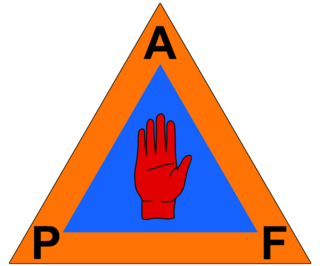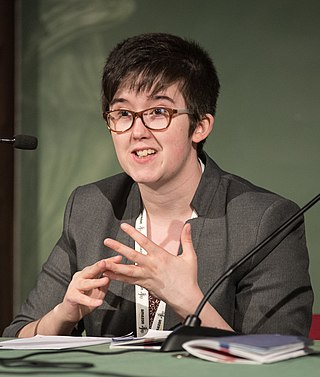
County Armagh is one of the six counties of Northern Ireland and one of the traditional thirty-two counties of Ireland. It is located in the province of Ulster and adjoins the southern shore of Lough Neagh. It borders the Northern Irish counties of Tyrone to the west and Down to the east. The county borders Louth and Monaghan to the south and southwest, which are in the Republic of Ireland. It is named after its county town, Armagh, which derives from the Irish Ard Mhacha, meaning "Macha's height". Macha was a sovereignty goddess in Irish mythology and is said to have been buried on a wooded hill around which the town of Armagh grew. County Armagh is colloquially known as the "Orchard County" because of its many apple orchards.

Portadown is a town in County Armagh, Northern Ireland. The town sits on the River Bann in the north of the county, about 24 miles (39 km) southwest of Belfast. It is in the Armagh City, Banbridge and Craigavon Borough Council area and had a population of about 32,000 at the 2021 Census. For some purposes, Portadown is treated as part of the "Craigavon Urban Area", alongside Craigavon and Lurgan.
Events from the year 1889 in Ireland.
This is a chronology of activities by the Provisional Irish Republican Army (IRA) from 1970 to 1979.

The South Armagh Brigade of the Provisional Irish Republican Army (IRA) operated during the Troubles in south County Armagh. It was organised into two battalions, one around Jonesborough and another around Crossmaglen. By the 1990s, the South Armagh Brigade was thought to consist of about 40 members, roughly half of them living south of the border. It has allegedly been commanded since the 1970s by Thomas 'Slab' Murphy who is also alleged to be a member of the IRA's Army Council. Compared to other brigades, the South Armagh IRA was seen as an 'independent republic' within the republican movement, retaining a battalion organizational structure and not adopting the cell structure the rest of the IRA was forced to adopt after repeated intelligence failures.

The Protestant Action Force (PAF) was a cover name used by Ulster loyalist paramilitary group the Ulster Volunteer Force (UVF) when claiming responsibility for a number of attacks during the Troubles in Northern Ireland. Sometimes these actions were carried out with the assistance of members of the security forces. The name "PAF" was first used in 1974 and attacks by individuals claiming to be members of the PAF killed at least 41 Catholic civilians. All of the attacks claimed by the PAF in Armagh and Tyrone counties from 1974 to 1976 have been linked to the Glenanne gang, which was a loose coalition consisting of members of the UVF Mid-Ulster Brigade along with rogue Ulster Defence Regiment (UDR) soldiers and Royal Ulster Constabulary (RUC) police officers. A six-year period of no attacks claimed by the PAF ended in 1982; during the 1980s, the PAF claimed 15 attacks in the Belfast area and two in County Armagh. UDR soldiers were convicted of two attacks in Armagh. The PAF claimed its last attacks in the early 1990s, all of which were in north Armagh and were alleged to involve members of the security forces.
Events during the year 1996 in Northern Ireland.
Events during the year 1991 in Northern Ireland.
Events during the year 1986 in Northern Ireland.
Events during the year 1982 in Northern Ireland.
Events during the year 1979 in Northern Ireland.
This is a timeline of actions by the Ulster Volunteer Force (UVF), an Ulster loyalist paramilitary group since 1966. It includes actions carried out by the Red Hand Commando (RHC), a group integrated into the UVF shortly after their formation in 1972. It also includes attacks claimed by the Protestant Action Force (PAF), a covername used by the UVF. Most of these actions took place during the conflict known as "the Troubles" in Northern Ireland.
UVF Mid-Ulster Brigade formed part of the loyalist paramilitary Ulster Volunteer Force in Northern Ireland. The brigade was established in Lurgan, County Armagh in 1972 by its first commander Billy Hanna. The unit operated mainly around the Lurgan and Portadown areas. Subsequent leaders of the brigade were Robin Jackson, known as "The Jackal", and Billy Wright. The Mid-Ulster Brigade carried out many attacks, mainly in Northern Ireland, especially in the South Armagh area, but it also extended its operational reach into the Republic of Ireland. Two of the most notorious attacks in the history of the Troubles were carried out by the Mid-Ulster Brigade: the 1974 Dublin and Monaghan bombings and the Miami Showband killings in 1975. Members of the Mid-Ulster Brigade were part of the Glenanne gang which the Pat Finucane Centre has since linked to at least 87 lethal attacks in the 1970s.

From 6 to 11 July 1997 there were mass protests, fierce riots and gun battles in Irish nationalist districts of Northern Ireland. Irish nationalists/republicans, in some cases supported by the Provisional Irish Republican Army (IRA), attacked the Royal Ulster Constabulary (RUC) and British Army. The protests and violence were sparked by the decision to allow the Orange Order to march through a Catholic/nationalist neighbourhood of Portadown. Irish nationalists were outraged by the decision and by the RUC's aggressive treatment of those protesting against the march. There had been a bitter dispute over the march for many years.

The bombing of RFA Fort Victoria took place on 6 September 1990, when a unit of the Provisional Irish Republican Army (IRA) planted two bombs aboard the Royal Fleet Auxiliary replenishment ship at Harland and Wolff shipyard in Belfast, Northern Ireland, where the vessel had been launched four months before. One of them exploded in the engine room, causing flooding and serious damage. The second device didn't explode and was defused several days later. The attack resulted in a two-year delay before Fort Victoria became fully operational.

Saoradh is a far-left political party and pressure group formed by dissident Irish republicans in 2016. It is active in both the Republic of Ireland and Northern Ireland. The Police Service of Northern Ireland and independent commentators describe the party as being close with the New IRA, although Saoradh themselves deny this.
Events from the year 2019 in Northern Ireland.

Lyra Catherine McKee was a journalist from Northern Ireland who wrote for several publications about the consequences of the Troubles. She also served as an editor for Mediagazer, a news aggregator website. On 18 April 2019, McKee was fatally shot during rioting in the Creggan area of Derry.
This is a chronology of activities by the Provisional Irish Republican Army (IRA), in 1990 and 1991.








